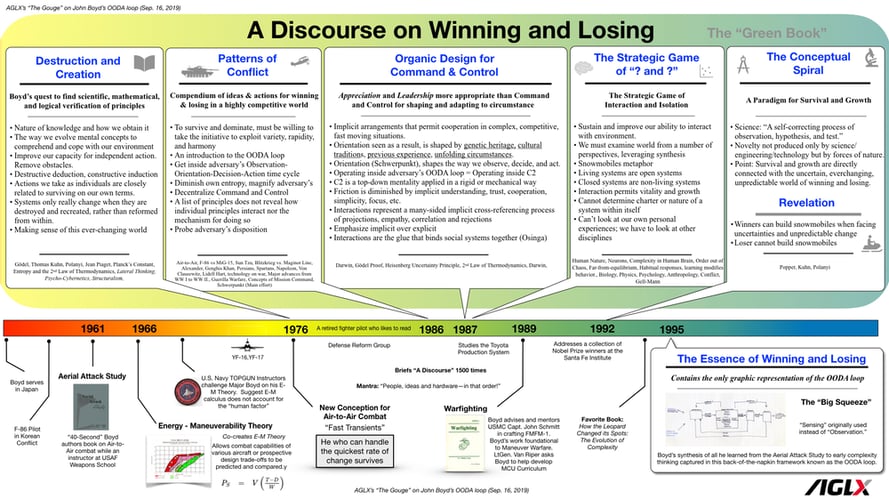In any competitive environment, adapting to evolving situations is a hallmark of winners. John Boyd, imparts an invaluable lesson in his brief "Patterns of Conflict":
"He who is willing and able to take the initiative to exploit variety, rapidity, and harmony—as the basis to create as well as adapt to the more indistinct—more irregular—quicker changes of rhythm and pattern, yet shape the focus and direction of effort—survives and dominates."
These insights are applicable to any competitive scenario. They are universal elements for success.
Variety in competition encompasses the ever-changing factors and variables that can influence outcomes. Mastering variety involves gathering information, understanding nuances, and making informed decisions. Those who adapt to unfolding circumstances and capitalize on shifting conditions will gain an edge.
Harmony involves aligning various elements to achieve a common goal. In competition, harmonizing creates a powerful synergy that enhances effectiveness. When work together in harmony, you gain a competitive advantage.
Rapidity is the art of acting swiftness and decisiveness. Quick decision-making and deliberate execution is often the difference between victory and defeat. The ability to adapt in real-time and seize fleeting opportunities is a key aspect of success.
Initiative is the power to take charge and dictate the course of events. In any competitive arena, taking the initiative can set the rules, drive progress, and force opponents to respond. This ability to lead is a game-changer, allowing you to control the situation rather than being controlled by it.
Boyd's wisdom extends to navigating the ambiguity and irregularity of competitive scenarios. The ability to adapt to uncertainty, expect the unexpected, and solve problems is crucial for success in any field.
Surviving and thriving isn't limited to reacting to circumstances. It's about proactively shaping your efforts' focus and direction. By defining the narrative and setting the tone, you gain the ability to influence outcomes. Thus you can lead in any competitive environment.
These principles have universal applications. In sport, athletes adapt to opponents', respond rapidly, and coordinate their physical abilities. In academia, scholars who set the course of research and adapt to new discoveries often lead their fields. In business pursuits, those who shape their goals and adapt to life's flow are more likely to succeed.
Embrace initiative, exploit variety, act rapidly, and foster harmony. By doing so you can navigate ambiguity and irregularity to lead, adapt, and dominate in any competitive situation. This applies on the playing field, in the classroom, or in the boardroom. Boyd's wisdom serves as a roadmap for success, allowing you to thrive and make a lasting impact in a world defined by competition and change.
Once more, from “Patterns of Conflict,” we end with this summary:
“He who is willing and able to take the initiative to exploit variety, rapidity, and harmony—as the basis to create as well as adapt to the more indistinct — more irregular — quicker changes of rhythm and pattern, yet shape the focus and direction of effort—survives and dominates.
“Or contrariwise:
“He who is unwilling or unable to take the initiative to exploit variety, rapidity, and harmony . . . goes under or survives to be dominated.”





